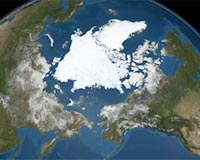| . |  |
. |
London (AFP) Oct 1, 2009 Climate change has "potentially huge security implications" and NATO countries should use the alliance as a forum to address the challenges it creates, the new NATO chief said Thursday. Rising sea levels, droughts and falling food production could spark large population movements and conflict, while the melting of Arctic ice risked inflaming tensions in the region, Secretary General Anders Fogh Rasmussen said. "I think it is within the natural scope of work for NATO to be the forum for consultation and discussion on these issues," he told reporters following a speech at a joint NATO and Lloyds conference in London. The melting of the ice cap in particular was likely to cause tensions, as shipping begins in the previously frozen Northwest Passage and competition breaks out for resources that were formerly under ice, he said. "The fact that new sea routes will be opened for navigating, the fact that we will get easier access to resources in the Arctic, might also increase the scope of competition in the region," Rasmussen added. "We known from experience that strengthened competition also increases the risks of tensions. And this is the reason why we have to do our utmost to reduce the risk of tensions and take action in due time." Five countries bordering the Arctic -- Canada, Denmark, Norway, Russia and the United States -- claim overlapping parts of the region, which is estimated to hold 90 billion untapped barrels of oil. Relations with Russia, which were badly strained after the Russia-Georgia war last year but have improved under the new administration of US President Barack Obama, would prove vital in the region, Rasmussen said. "With the aim to reduce tensions... in the Arctic region, I think we need cooperation between NATO and Russia and between individual allies and Russia," he said. However, Rasmussen -- who took over as secretary general in August -- said politicians shouldered the bulk of the responsibility for climate-related security, in cutting emissions and preparing for natural disasters. "Climate change may have potentially huge security implications, but the response cannot be exclusively military," he said. Share This Article With Planet Earth
Related Links Beyond the Ice Age
 Arctic ice pack at third lowest extent since 1979: US
Arctic ice pack at third lowest extent since 1979: USWashington (AFP) Sept 18, 2009 The Arctic sea ice pack thawed to its third smallest size on record during the northern hemisphere summer of 2009, US government scientists said, citing satellite images. While the sea ice pack at its lowest 2009 point was slightly larger than both the record-low ice pack measured in 2007 and the summer 2008 ice pack, the data confirms a shrinkage trend seen over the past 30 years, the US ... read more |
|
| The content herein, unless otherwise known to be public domain, are Copyright 1995-2009 - SpaceDaily. AFP and UPI Wire Stories are copyright Agence France-Presse and United Press International. ESA Portal Reports are copyright European Space Agency. All NASA sourced material is public domain. Additional copyrights may apply in whole or part to other bona fide parties. Advertising does not imply endorsement,agreement or approval of any opinions, statements or information provided by SpaceDaily on any Web page published or hosted by SpaceDaily. Privacy Statement |